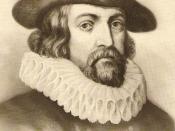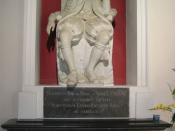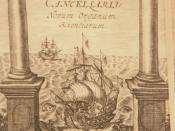Sir Francis Bacon
Sir Francis Bacon was born January 22, 1561. He died April 9,
1626. He was an English essayist, lawyer, statesman, and philosopher . He
had a major influence on the philosophy of science. When he was 12 years
old, he began studies at Trinity College, Cambridge. In 1576 he entered
Gray's Inn to pursue a career in law. He was first elected in 1584.
Bacon's opposition to royal tax measures would probably have brought
an end to his political advancement, but he had the support of the Earl of
Essex, whose prosecution for treason he later managed. He was knighted in
1603 after the succession of James I. Bacon and he became solicitor-general
in 1609, attorney-general in 1613, lord keeper of the great seal in 1617, and
lord chancellor in 1618; he was also created Baron of Verulam I 1618, and
Viscount St. Albans in 1621. Bacon retained James's favor by steadfast
defense of royal prerogative, but in 1621 he was found guilty of accepting
bribes and was removed from his office.
Retiring to Gorhambury, he
devoted himself to writing and scientific work.
Philosophically, Bacon wrote marks such as the Instauratio Magna
(Great Restoration), setting forth his concepts for the restoration of
humankind to mastery over nature. It was intended to contain six parts: first
a classification of sciences; second a new inductive logic; third a gathering of
empirical and experimental facts; fourth examples to show the effectiveness
of his new approach; fifth generalization derivable from natural history; and a
new philosophy that would be a complete science of nature.
Bacon completed only two parts, however, the Advancement of
Learning in 1605, later expanded as De Dignitate et Augmentis Scientiarum
(On the Dignity and Growth of Sciences, 1620); and the Novum Organum
(The New Organon, 1620),



Bacon made easier
the time line effect makes it easy to gather information on him. It is very well written and informative. I actually learned new things about him instead of the same old stuff.
4 out of 4 people found this comment useful.